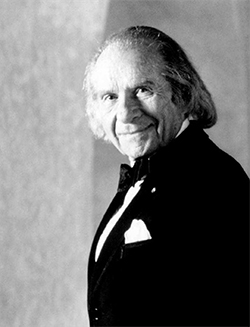by Daniel Hathaway
TODAY’S ALMANAC:

One of America’s most-recorded conductors, Fennell’s credits include 29 recordings on the Mercury label. He also made history for his collaboration with Jack Renner and Robert Woods, founders of Cleveland’s Telarc Records, who made the first-ever symphonic digital recording with Fennell conducting the Cleveland Symphonic Winds — including the wind, brass, and percussion sections of The Cleveland Orchestra — in Severance Hall in April, 1978. The recording of Gustav Holst’s Suites for Military Band similarly made history in 1983 when it became part of one of the first recordings to be released in the new compact disc format.
Read the history of making that recording in an article on Engineering and Technology Wiki, and listen to those performances of Holst’s Suite No. 1 in E-flat and Suite No. 2 in F here and here (where you can follow along with the reduced conductor’s score). And watch Frederick Fennell in action rehearsing the Indiana State University Wind Ensemble in 1997.
TODAY ON THE WEB AND AIRWAVES:
At noon, WCLV 104.9 Ideastream features music by Beethoven, Piston, and Mozart on Lunchtime with The Cleveland Orchestra. This evening, Oberlin Stage Left presents David Bowlin and Tony Cho performing Aaron Copland’s Violin Sonata (a conversation with the artists and ClevelandClassical.com’s Mike Telin considers why the work has been neglected and its enduring resonance). And it’s Carmen from the MET Opera Archives this evening, in a performance from 2014. Details here.
INTERESTING READS:
In an article published on the Early Music America website, ClevelandClassical.com managing editor Jarrett Hoffman explores how two early music programs — both led by Kenneth Slowik of the Smithsonian Institution — are dealing with access issues and managing this summer’s disruptions due to the pandemic. In Two Early Music Programs Embrace Change and Inclusion, Hoffman visits the Smithsonian’s Haydn Academy and Oberlin’s Baroque Performance Institute to talk with participants. Read the story here.
In a New York Times article, composer Joel Thompson talks about his The Seven Last Words of the Unarmed. Written in 2014 when the composer was 24 and inspired by the killings of Michael Brown and Eric Garner, the work “is finding new listeners in a summer of unrest.” Hear two performances of the work: the one quoted in the article, sung by the University of Michigan Men’s Glee Club, and a second sung by the men of Cleveland Chamber Choir in a March concert commemorating the 50th anniversary of the Kent State shootings.
And England’s The Guardian reports on Madrid’s Teatro Real, which is experimenting with socially-distanced opera, “becoming one of the world’s first opera houses to return to the stage with a production that includes a chorus, orchestra and soloists after months of lockdown. On offer is Verdi’s La Traviata, tweaked to reflect life in the time of Covid-19.” Read the story here.



